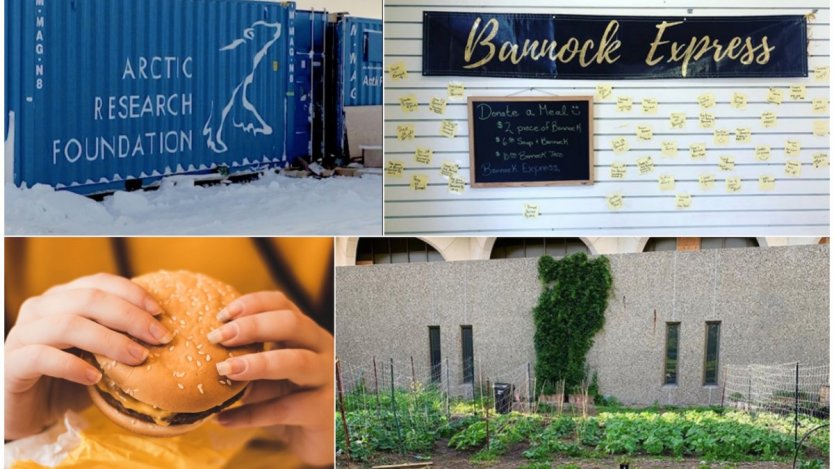This week’s food news was full of optimism as many focused on food availability, funds and programs directed to the Canadian food industry and human rights.
Rachel Smith, owner and creator of Bannock Express in Saskatoon, wanted a way to give back to her community after learning about a meal-sharing initiative from New York. She is now facilitating a pay-it-forward program that sees meals donated to those in need from her business. Related to giving food to those in need, one University of Regina student goes the extra mile to make sure that his peers and community stay fed through a community garden.
Growing produce is not an easy task in the north. The Canadian Space Agency has stepped in to train communities in Nunavut to maintain their greenhouses, while also using it for research on growing food in space.
Back on Earth, McDonald's Canada announces its return to using only Canadian beef after sourcing imported beef during the height of the pandemic.
These news stories and more in our recap below.
Bannock Express pays it forward with pre-paid meals
Inspired by a pizza wall that went viral in New York City as a way to pay it forward, Rachel Smith, owner of Bannock Express, put her own twist on this charitable effort. The idea follows the structure of paying for a meal and putting a sticky note on the wall, which someone in need can then grab and redeem for a free meal.
Smith created a program where customers can donate between $2 and $10 to add a meal to the wall. Since this program's creation in June, they have seen about 20 people take advantage of these free meals each week.
Read more about this from CTV.
The Canadian Space Agency lends a hand with greenhouses in the north
A collaborative effort between The Canadian Space Agency and a community greenhouse project in Gjoa Haven. The Naurvik greenhouse concept was sparked through the realization that growing food in the north is similar to that of space. The technology that has been introduced to the community will help astronauts learn the best way to grow fresh food in space. The greenhouse is currently growing lettuce and red peppers as their harvest for the summer.
The main production goal of this greenhouse is to grow as many greens as possible with minimal resources. In addition to The Canadian Space Agency using the community of Gjoa Haven as a research facility, they will also teach the residents how to maintain and use the greenhouse for themselves.
Read more about this from the CBC.
$2.6M to go toward the development of plant-based products in Alberta
With COVID-19 revealing potential weaknesses in Canada’s food supply chain, the Canadian government is providing $18 million to small food businesses across the country, from distilleries in Quebec to agriculture-related work in small towns of Northern Ontario.
One of the most notable sums will be heading to Leduc, AB, where $2.6 million will be given to the Food Processing Development Centre to help companies develop plant-based food and products.
Read more about this at CBC.
McDonald's Canada returns to using 100 per cent Canadian beef
McDonald's Canada has recently announced that come September, they will return to using 100 per cent Canadian beef. This beef is mainly sourced from farms located in Alberta and Saskatchewan.
Due to supply shortages during the height of the pandemic and the shutdown of the Cargill plant near High River, AB, McDonald's Canada has had to import their beef from other countries. The company says that over 80 per cent of the beef still came from Canada during this time. McDonald's Canada has exclusively been using Canadian beef since 2003.
Visit Global News for more on this story.
University of Regina student is single-handedly running a community garden
The Regina Public Interest Research Green Patch Garden, located at the University of Regina, grows organic food for students and the community. With its usual yield allowing volunteers to donate 1,500 to 2,000 pounds of food a year, it has become a much-needed program in the community.
This year, with fewer volunteers due to COVID-19 restrictions and a higher than usual demand due to unemployment and other related factors, Tayef Ahmed, took control of the 5,400 square foot garden himself.
Ahmed, a human justice undergraduate, has donated more than 600 pounds of food to those in need, and he’s hoping to get to reach 2,000 pounds by the end of the summer. Requests for assistance from students are rising as they are unable to get summer jobs to pay for their living, school expenses, and food.
The garden produces beans, carrots, tomatoes, squashes, zucchini, cucumbers and peppers, which are available to the public every week.
Read more from Global News.
Toronto woman compensated $10,000 after restaurant violated her human rights
This week, the Human Rights Tribunal of Ontario has ruled that the Pentagram Bar and Grill’s refusal to let Haily Butler-Henderson use the bathroom was discrimination and ordered the Toronto restaurant to pay Butler-Henderson $10,000 in compensation.
Four years ago, Butler-Henderson, who uses mobility aids, was barred from using the Pentagram Bar and Grill's downstairs restroom. A server physically blocked her path and forced her to accept the risk and liability associated with going down the stairs before allowing her access.
Pentagram management and staff must also go through training on the standards that they are held to, according to the Human Rights Code of Ontario.
Learn more from the Globe and Mail.













